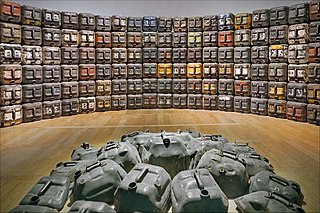Related Research Articles
Gender studies is an interdisciplinary academic field devoted to analysing gender identity and gendered representation. Gender studies originated in the field of women's studies, concerning women, feminism, gender, and politics. The field now overlaps with queer studies and men's studies. Its rise to prominence, especially in Western universities after 1990, coincided with the rise of deconstruction.
Postcolonial feminism is a form of feminism that developed as a response to feminism focusing solely on the experiences of women in Western cultures and former colonies. Postcolonial feminism seeks to account for the way that racism and the long-lasting political, economic, and cultural effects of colonialism affect non-white, non-Western women in the postcolonial world. Postcolonial feminism originated in the 1980s as a critique of feminist theorists in developed countries pointing out the universalizing tendencies of mainstream feminist ideas and argues that women living in non-Western countries are misrepresented.
Feminist theory is the extension of feminism into theoretical, fictional, or philosophical discourse. It aims to understand the nature of gender inequality. It examines women's and men's social roles, experiences, interests, chores, and feminist politics in a variety of fields, such as anthropology and sociology, communication, media studies, psychoanalysis, political theory, home economics, literature, education, and philosophy.
Transnational feminism refers to both a contemporary feminist paradigm and the corresponding activist movement. Both the theories and activist practices are concerned with how globalization and capitalism affect people across nations, races, genders, classes, and sexualities. This movement asks to critique the ideologies of traditional white, classist, western models of feminist practices from an intersectional approach and how these connect with labor, theoretical applications, and analytical practice on a geopolitical scale.
Uma Narayan is an American feminist scholar and a current professor of philosophy at Vassar College on the Andrew W. Mellon Chair of Humanities. Narayan's work focuses on the epistemology of the inequities involving postcolonial feminism.
Elizabeth A. Grosz is an Australian philosopher, feminist theorist, and professor working in the U.S. She is Jean Fox O'Barr Women's Studies Distinguished Professor Emerita at Duke University in Durham, North Carolina, U.S.

Griselda Frances Sinclair Pollock is an art historian and cultural analyst of international, postcolonial feminist studies in visual arts and visual culture. Since 1977, Pollock has been an influential scholar of modern art, avant-garde art, postmodern art, and contemporary art. She is a major influence in feminist theory, feminist art history, and gender studies. She is renowned for her innovative feminist approaches to art history which aim to deconstruct the lack of appreciation and importance of women in art as other than objects for the male gaze.
Greta Gaard is an ecofeminist writer, scholar, activist, and documentary filmmaker. Gaard's academic work in the realms of ecocriticism and ecocomposition is widely cited by scholars in the disciplines of composition and literary criticism. Her theoretical work extending ecofeminist thought into queer theory, queer ecology, vegetarianism, and animal liberation has been influential within women's studies. A cofounder of the Minnesota Green Party, Gaard documented the transition of the U.S. Green movement into the Green Party of the United States in her book, Ecological Politics. She is currently a professor of English at University of Wisconsin-River Falls and a community faculty member in Women's Studies at Metropolitan State University, Twin Cities.

A variety of movements of feminist ideology have developed over the years. They vary in goals, strategies, and affiliations. They often overlap, and some feminists identify themselves with several branches of feminist thought.
Feminist ethics is an approach to ethics that builds on the belief that traditionally ethical theorizing has undervalued and/or underappreciated women's moral experience, which is largely male-dominated, and it therefore chooses to reimagine ethics through a holistic feminist approach to transform it.
Srinivas Aravamudan was an Indian-born American academic. He was a professor of English, Literature, and Romance Studies at Duke University, where he also served as dean of the humanities. He was widely recognized for his work on eighteenth-century British and French literature and postcolonial literature and theory. His publications included books and articles on novels, slavery, abolition, secularism, cosmopolitanism, globalization, climate change, and the anthropocene.

Decoloniality is a school of thought that aims to delink from Eurocentric knowledge hierarchies and ways of being in the world in order to enable other forms of existence on Earth. It critiques the perceived universality of Western knowledge and the superiority of Western culture, including the systems and institutions that reinforce these perceptions. Decolonial perspectives understand colonialism as the basis for the everyday function of capitalist modernity and imperialism.
Chela Sandoval, associate professor of Chicana Studies at University of California, Santa Barbara, is a noted theorist of postcolonial feminism and third world feminism. Beginning with her 1991 pioneering essay 'U.S. Third World Feminism: The Theory and Method of Oppositional Consciousness in the Postmodern World', Sandoval emerged as a significant voice for women of color and decolonial feminism.
Indigenous feminism is an intersectional theory and practice of feminism that focuses on decolonization, Indigenous sovereignty, and human rights for Indigenous women and their families. The focus is to empower Indigenous women in the context of Indigenous cultural values and priorities, rather than mainstream, white, patriarchal ones. In this cultural perspective, it can be compared to womanism in the African-American communities.
Lisa E. Bloom is an American cultural critic, educator and feminist art historian specializing in polar studies, contemporary art, environmental art, history of photography, visual culture and film studies and is known for her books and essay contributions to these areas.

Chandra Talpade Mohanty is a Distinguished Professor of Women's and Gender Studies, Sociology, and the Cultural Foundations of Education and Dean's Professor of the Humanities at Syracuse University. Mohanty, a postcolonial and transnational feminist theorist, has argued for the inclusion of a transnational approach in exploring women’s experiences across the world. She is author of Feminism Without Borders: Decolonizing Theory, Practicing Solidarity, and co-editor of Third World Women and the Politics of Feminism, Feminist Genealogies, Colonial Legacies, Democratic Futures, Feminism and War: Confronting U.S. Imperialism,, The Sage Handbook on Identities, and Feminist Freedom Warriors: Genealogies, Justice, Politics, and Hope.

Zineb Sedira is a London-based Franco-Algerian feminist photographer and video artist, best known for work exploring the human relationship to geography.

Emma Pérez is an American author and professor, known for her work in queer Chicana feminist studies.
Naomi Ruth Goldenberg is a professor at the University of Ottawa. Her regular undergraduate courses include Gender and Religion, Women and Religions, Psychology of Religion and Method and Theory in the Study of Religion. Goldenberg is best known for her work in the areas of Feminist Theory and Religion, Gender and Religion, as well as the Psychoanalytic Theory and Political Theory of Religion. She is one of the early members of the Women's Caucus at the American Academy of Religion and Society of Biblical Literature and continues to work on and support scholarship in areas of religion and feminism, psychoanalytic theory, women's issues, gender.
References
- Houtman, Coral (August 2005). "Dark Continents: Psychoanalysis and Colonialism (review)" (PDF). Leonardo . 38 (4). Retrieved 2014-03-09.[ specify ]
- R.Khanna. "Asylum." Texas International Law Journal. Jul 1, 2006. http://www.encyclopedia.com/doc/1P3-1215282531.html
- Boitten, Jennifer. https://www.h-net.org/reviews/showrev.php?id=32480
- Neath, Nic. http://onlinelibrary.wiley.com/doi/10.1002/ppi.131/abstract